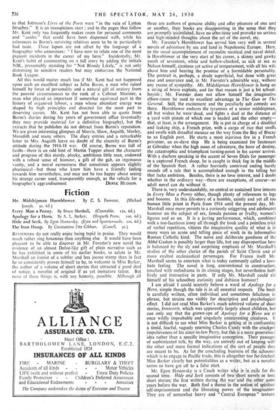Burns of Battersea
John Burns: Labour's Lost Leader. A biography by William Kent. (Williams and Norgate. 25s.) MR. WILLIAM KENT is already the editor of An Encyclopaedia of London, and he has now produced something like a 400-page encyclopaedia of that great Londoner John Burns. But he has not written the biography that that remarkable character deserved. In fact Mr. Kent, for all his industry and application, shows himself lacking in several of the essentials of a successful biographer —among them, a good prose style, the gift of discrimination, and the ability to shape chunks of raw material into a fluent narrative. Many of these pages look as if they had been compiled , from a series of press cuttings, too often from the local paper the South- Western Star, sorted into chronological order but otherwise barely disguised. On p. 269 there is a paragraph recording the death of an old lady of 106 and the birth and early death of four children —which seems to have no connection whatever with John Burns except that these events occurred in Battersea. This is an extreme instance ; but it will suggest the haphazard nature of the book. Mr. Kent says that it was originally much longer and has already been pruned. Full of interesting material though it is, one wishes he had pruned it still further. Another obstacle to the enjoyment of the book is that Mr. Kent shows himself almost as great an egoist as John Burns. He begins his preface: " When I met John .113urns in 1938 I think he felt he had found his biographer," and he goes on to suggest a daring comparison between William Kent and James Boswell and to tell us that Johnson's Lives of the Poets were " in the vein of Lytton Strachey." It is an inauspicious start ; and in the pages that follow Mr. Kent only too frequently makes room for personal comments and " asides " that could have been dispensed with, while his references to Burns's surviving relatives seem to be in particularly bad taste. These lapses are not offset by the language of a biographer who announces: " 1 have now to relate one of the most piquant incidents in the career of my hero." Incidentally, Mr. Kent's habit of commenting on a tall story by adding the initials NBL, presumably standing for " Not Bloody Likely," is not only distressing to sensitive readers but may embarrass the National Book League.
All this would matte' much less if Mr. Kent had not happened upon such an excellent subject as John Burns, a man who raised himself by force of personality and a natural gift of oratory from the poorest circumstances to the rank of a Cabinet Minister, a man who played an important if somewhat equivocal part in the history of organised labour, a man whose abundant energy was shaped by high principles and directed for the most part to deserving causes. Mr. Kent has not been able to quote from Burns's diaries during his years of government office (eventually they may provide material for a definitive biography), but the extracts• that he publishes do not detract from Burns's reputation. We are given interesting glimpses of Morris, Shaw, Asquith, Morley, Meredith and many others. The diary entries and a remarkable letter to Mrs. Asquith leave no doubt of the sincerity of Burns's attitude during the 1914-18 war. Of course, Burns was full of faults—there is an odd hint of Martin Tupper about the character and progress of this sturdy, plucky, ambitious little man, endowed with a robust sense of humour, a gift of the gab, an ingenuous vanity, and a moral earnestness that sometimes appears slightly pharisaical—but those who knew him have a friendly feeling towards him nevertheless, and may not be too happy about seeing his strange career used, transparently enough, as the vehicle for a







































 Previous page
Previous page